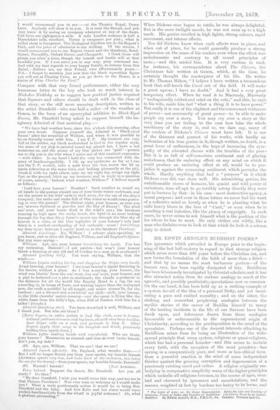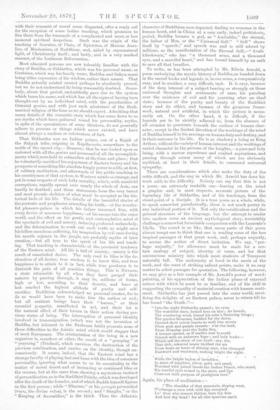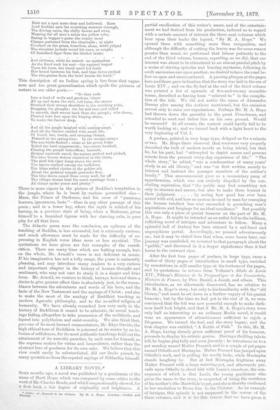MR. EDWIN ARNOLD'S BUDDHIST POEMS.*
THE ignorance which prevailed in Europe prior to the begin- ning of the last half-ceatury in regard to that strange religion which arose more than 600 years before the Christian era, and now forms the foundation of the faith of more than a third— and that by no means the most barbarous portion—of the human race, has been rapidly dissipated of late. Buddhism- has been laboriously investigated by Oriental scholars, and it has also attracted notice from its curious analogy to much of the- agnostic, and possibly pantheistic, speculations now so common On the one hand, it has been held up as a striking example of a system devoid of the idea of a personal Deity, and yet incul- cating a pure and exalted morality ; and on the other, the striking and somewhat perplexing analogies between the, mythic stories of the career of Buddha himself to many of the leading incidents in the life of our Saviour have been dwelt upon, and inferences drawn from these analogies favourable or unfavourable to the supernatural origin a Christianity, according to the predisposition in the mind of the speculator. Perhaps one of the deepest interests attaching to Buddhism arises from its being an illustration of the wide- spread principle that every system, religious or quasi-religious, which has had a personal founder—and this seems to include every faith, with the exception of the most primitive—has sprung in a comparatively pure, and more or less ethical form from a powerful reaction in the mind of some independent thinker against the growing corruption and degeneration of a previously existing creed and cultus. A religion originally em- bodying in comparative simplicity many of the higher principles which underlie all religions becomes, in the course of ages, over- laid and obscured by ignorance and sacerdotalism, and the masses, weighted at last by burdens too heavy to be borne, and * Tios Light of Asia ; or, the Great Renunciation. Being Me We and Teaching of Gautama, Prince of India, and Pounder of Buddhism. (As told in Verse by an Indian. Ruddhise. By Edwin Arnold, MA., F.E.G.13., dm London; Tttibner and Co..
with their remnant of moral sense disgusted, offer a ready soil for the reception of some bolder teaching, which promises to free them from the trammels of a complicated and. more or less immoral spiritual despotism. Such was the origin of the teaching of Socrates, of Plato, of Epictetus, of Marcus Aure- lius, of Moslemism, of Buddhism, and, aided by supernatural light, of Christianity itself ; and lastly, and. in a very marked manner, of the Lutheran Reformation.
Most educated persons are now tolerably familiar with the story of Buddha, or Siddartha, which was his personal name, or Gautima, which was his family name, Buddha and Sakya-muni being titles expressive of his wisdom, rather than names. That Buddha actually existed cannot perhaps be absolutely proved, but we do not understand its being reasonably doubted. Some- body, about that period, undoubtedly gave rise to the system which bears his name, and which has all the signs of having been thought-out by an individual mind, with the peculiarities of Oriental genius, and with just such admixture of the Brah- manical religion of the time as we should expect. Admitting that many details of the romantic story which has come down to us are myths which have gathered round his personality, myths, in spite of the speculations of seine thinkers, do not generally adhere to persons or things which never existed, and have almost always a nucleus or substratum of fact.
That Siddartha was an Indian prince, son of a Rajah of the Sakyah tribe, reigning in Kapilavastu, somewhere to the north of the sacred city,—Benares ; that he was looked upon as endowed with all the genius and possessed of all the accomplish- ments which:were:held in estimation at the time and place; that he voluntarily sacrificed his enjoyment of Eastern luxury and his prospects of something like absolute kingly power to a life, at first, of solitary meditation, and afterwards of the public teaching to his countrymen of that system, to Western minds so strange, and yet in some respects of such lofty morality, which, with manifold corruptions, rapidly spread over 'nearly the whole of Asia, can hardly be doubted ; and these statements form the very barest and most prosaic skeleton of what must be accepted as the his- torical facts of his life. The details of the beautiful stories of the portents and prophecies attending his birth,—of the wonder- ful pleasure-palace in which his father immured him, with every device of sensuous happiness,--of his escape into the outer world, and the effect on his gentle and contemplative mind of the spectacle of evil and. misery, inducing profound melancholy, and the determination to work out such truth us might save his fellow-menfrom suffering, his temptation by evil ones during his ascetic sojourn in the jungle, are probably myths of later creation,—but all true to the spirit of his life and teach- ing. That teaching is characteristic of the pessimist tendency of the Eastern mind. All life is full of misery,—misery is the result of unsatisfied desire. The Only road to bliss is the de- struction of all desire ; true wisdom is to know this, and true happiness is to attain to it in fact, while true goodness is to diminish the pain of all sensitive things. This is Nirvana, a state attainable by all when they have purged their natures by passing through, it may be, millions of forms, high or low, according to their deserts, and have at last reached the highest altitude of purity and self- sacrifice. Buddhism acknowledged no personal creator, for to do so would. have been to make him the author of evil ; but all sentient beings have their "karma," or their essential property, manifested in act, and their lot is the natural effect of thew karma in their action during pre- vious states of being. The interruption of personal identity involved in transmigration (which was not the invention of Buddha, but inherent in the Brahman faith) presents none of those difficulties to the Asiatic mind which would stagger that of most Europeans. The reintegration of the being in a now organism is, somehow or other, the result of a " grasping " or " yearning " (Thelma), which survives the destruction of the previous combination, and carries on the identity, though un- consciously. It seems, indeed, that the Eastern mind has a strange faculty of playing fast and loose with the idea of conscious personality, ignoring what seems to us its essentiality in the matter of moral desert and of increasing or continued. bliss or the reverse, but at the same time showing a mysterious instinct of personification, as in the Buddhist Trinity, which was developed after the death of the founder, and of which Buddh himself figures as the first person ; while " Dharma," or his precepts personified (Xoyoc, the divine cactaa), is the second ; and " Saugha," or the "Keeping of Assemblies," is the third. Thus the Atheistic
character of Buddhism soon departed, finding no response in the human heart, and in China at a very early, indeed prehistoric, period, Buddha became a god, as " Amitabha," the eternal, the father of Men, or the "Universal Self." " Self" shows itself by "speech ;" and speech was and is still adored by millions, as the manifestation of the Eternal Self,—" Avalo kiteshwara," who has "a thousand arms, and a thousand eyes, and a merciful heart," and has bound himself by an oath to save all that breathes.
To write, as has been attempted by Mr. Edwin Arnold, a. poem embodying the mystic history of Buddha, as handed down in the sacred books and legends, is, in one sense, a comparatively easy, and in another, a very difficult, task. It is easy, because, of the deep interest of a subject bearing so strongly on those universal thoughts and sentiments of man, his puzzling over the existence of evil and his yearning after an ideal state; because of the purity and beauty of the Buddhist story and its ethics, and because of the gorgeous frame- work, natural and artificial, in which the picture is neces- sarily set. On the other hand, it is difficult, if the legends are to be strictly adhered to, from the absence of all occasion to penetrate beneath the surface of human char- acter, except in the limited direction of the workings of the mind of Buddha himself in his musings on human duty and destiny, and. in their outcome in his life. He is as shadowy a being as King Arthur, without the variety of human interest and the workings of varied character in the persons of the knights,—a pure and holy being, with a narrow experience and exalted aspirations, and. passing through scenes many of which are too obviously mythical, at least in their details, to command universal sympathy.
There are considerations which also make the duty of the critic difficult, and the way in which Mr. Arnold. has done his work adds to the difficulty. Nobody can say that this is not a poem—an extremely readable one—leaving on the mind a graphic and, in most respects, accurate picture of the legendary life of Siddartha, and of his teachings, from the stand-point of a disciple. It is a true poem as a whole, while, to speak somewhat paradoxically, there is not much poetry in any individual portion of it. Not only the versification and the general structure of the language, but the attempt to render into modern verse an ancient mythological story, irresistibly challenge a somewhat formidable comparison with the Laureates Idylls. The sound is so like, that many parts of this poem almost tempt one to think that one is reading some of the less inspired passages of that great work, and, perhaps unjustly, to accuse the author of direct imitation. We say, "per- haps unjustly," for allowance must be made for a cer- tain analogy of subject, identity of verse, and for that unconscious mimicry into which most students of Tennyson naturally fall. The uniformity of level in the merit of the work, and the want of striking salient points, make it no easy matter to select passages for quotation. The following, however, we may give as a fair example of Mr. Arnold's power of word- painting, of his appreciation of the Indian phase of external nature with which he must be so familiar, and of his skill in suggesting the sympathy of material creation with human senti- ment. Siddartha has just passed into the outer world, sacri- ficing the delights of an Eastern palace, never to return till he has found "the Truth
:"- "Into the night Siddartha passed ; its eyes,
The watchful stars, looked love on him ; its breath, The wandering wind, kissed his robe's flattering fringe ; The garden-blossoms, budded for the dawn, Opened their velvet hearts to waft him scents
From pink and purple censors: &or the land,
From Himalay unto the India Sea, A tremor spread, as if earth's soul beneath
Stirred with an unknown hope ; and holy books—
Which tell the story of our Lord—say, too, That rich, celestial music thrilled the air From hosts on hosts of shining ones, who thronged Eastward and westward, making bright the night.
While the bright legion of invisibles, In arms of sapphire, silver, gold, and pearl, Watched with joined hands the Indian Prince, who stood, His tearful oyes raised to the stare, and lips Close-set with purpose of prodigious love."
Again, his place of meditation :—
"The shoulder of that mountain, sloping west, O'orhangs a cave with wild figs canopied. Le! thou who earnest thither, bare thy feet And bow thy head for all this spacious earth
Rath not a spot more dear and hallowed. Here Lord Buddha sate the scorching summer through, The driving rains, the chilly dawns and eves, Wearing for all men's sakes the yellow robe, Eating in beggar's guise the scanty meal Chance gathered from the charitable ; at night Couched on the grass, homeless, alone, while yelped The sleepless jackals round his cave, or coughs Of famished tiger from the thicket brake.
. . ........ And °Mimes, while he mused—as motionless As the fixed rock his seat—the squirrel leaped Upon his knee, the timid quail led forth Her brood between his feet, and blue doves pecked The rice-grains from the bowl beside his hand."
This description of an Indian spring is free from that vague- ness and too great generalisation which spoils the pictures of nature in our older poets :—
"So they rode
Into a land of wells and gardens, where All up and clown the rich, red loam, the steers Strained their strong shoulders in the creaking yoke, Dragging the ploughs ; the fat soil rose and rolled In smooth, dark waves back from the plough; who drove, Planted both feet upon the leaping share, 'To make the furrow deep.
. . ..... . .
And all the jungle laughed with nesting-songs.
And all the thicket rustled with small life, Of lizard, bee, beetle, and creeping things, Pleased at the spring-time. In the mango-sprays The sun-birds flashed ; alone at his green forgo Toiled the loud coppersmith ; bee-eaters hawked, Chasing the purple butterflies ; beneath, Striped squirrels raced, the mynas perked and picked, The-nine brown sisters chattered in the thorn, The pied fish-tiger hung above the pool, The egrets stalked among the buffaloes, The kites sailed circles in the golden air, About the painted temple peacocks flew, The blue doves cooed from every wall, far off The village drums beat for some marriage feast ; All things spoke peace and plenty."
There is more vigour in the picture of Buddha's temptation in the jungle, where he is beset by various personified sins— Mara, the Prince of Darkness, and his crew of "passions horrors, ignorances, lusts "—than in any other passage of this poem ; and in a lower key, where the myth is related of his having, in a previous state of being, when a Brahman, given himself to a famished tigress with her starving cubs, in pure pity for all that lives.
The didactic poem near the conclusion, an epitome of the
teaching of Buddha, is less successful, but is extremely curious, and much allowance must be made for the difficulty of ex- pressing in English verse ideas more or less mystical. The quotations we have given are fair examples of the versifi- oation. There are many lines which arc halting enough, but, on the whole, Mr. Arnold's verse is not deficient in music. If his imagination has not a lofty range, the poem is eminently pleasing, and may introduce many readers to a very curious and important chapter in the history of human thought and sentiment, who may not care to study it in a deeper and drier form. Mr. Arnold, we venture to think, betrays here and there a desire to give greater effect than is absolutely just, to the resem- blance between the adventures and words of his hero, and the facts of the New Testament and the sayings of Christ ; and also to make the most of the analogy of Buddhist teaching to modern Agnostic philosophy, and to the so-called religion of humanity. We have already remarked how very early in the history of Buddhism it ceased to be atheistic, its moral teach- ings failing altogether to take possession of the multitude, and lapsed into polytheism and saint-worship. We also think that, pace one of its most learned commentators, Mr. Rhys Davide, the high ethical tone of Buddhism is poisoned at its source by an in- fusion of selfishness, for its most authentic teachings hold out the attainment of its narcotic paradise, by each man for himself, as -the supreme motive for virtue and benevolence, rather than the abstract love of goodness for its own sake. We believe that this view could easily be substantiated, did our limits permit, by many quotations from the reputed sayings of Siddartha himself.




































 Previous page
Previous page